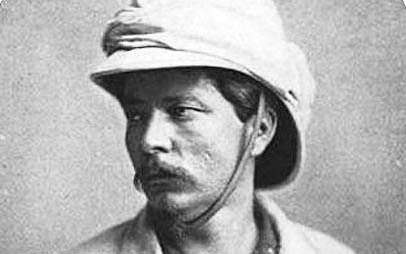Dusty Relics of Arkansas History
September 16-22, 2019
By Bob Denman
bgdenman@ualr.edu
Sir Henry Morton Stanley
You have likely heard the phrase “Dr. Livingstone, I presume?” and if so you may also know something of Sir Henry Morton Stanley.
He is a world-renowned journalist and explorer of the African continent who mapped its lakes and the Congo River, the continent’s second longest. He wrote the bestselling book “How I Found Livingstone” and later in life took a commission from King Leopold II of Belgium to annex much of the Congo River basin.
Welsh born in 1841 as John Rowlands, he was raised by his grandparents until signing on as a cabin boy on a ship bound to New Orleans where he eventually found work as a dockside laborer. Henry Stanley, a successful businessman, made notice of Rowlands and hired him as errand runner eventually becoming his tutor and surrogate father. Stanley’s kindnesses lead young Rowlands to adopt the name of Henry Stanley.
He was hired by J. G. Bennett of the New York Herald to go to Africa in search of Scottish missionary Dr. David Livingstone who had not been heard from in years and feared dead. Stanley organized a substantial expedition and eventually found the famed missionary short of supplies and in ill health. Reaching out to shake Livingstone’s hand he famously said, “Dr. Livingstone, I presume?” Asked why that phrase, which stayed with him his entire career, he replied “I couldn’t think of what else to say”.
So, what the heck does Sir Henry Stanley have to do with Arkansas? I was recently re-reading “Confederates in the Attic” by Tony Horwitz and found mention of Stanley fighting in the battle of Shiloh. It seems Stanley left New Orleans landing in Arkansas in 1860 hiring on as a general store sales clerk in Cypress Bend on the Arkansas River below Pine Bluff. He was well liked and agreeable and had buddies enlisting to fight for the Confederacy during the coming American Civil War. He decided to join as well enlisting in the Sixth Arkansas Infantry Regiment. The Sixth Arkansas mustered in at Little Rock in June of 1861, was issued flintlock rifles from the Federal Arsenal (todays MacArthur Park) and began service east of the Mississippi River. While the Sixth Arkansas took heavy losses at Shiloh, Stanley survived but was captured by Union forces and sent to the most feared Union POW stockade, Camp Douglass in Chicago. While at Camp Douglass he was offered his freedom by enlisting in the Union Army. He accepted and was listed as a deserter in 1863, very un-Stanley like and the rest is history.
He married at the age of 50, was elected to Parliament and granted the Grand Cross of the Bath, a British order of chivalry, by Queen Victoria.
From the Sixth Arkansas Infantry to British aristocracy, Sir Henry Morton Stanley is a Dusty Relic of Arkansas history.




